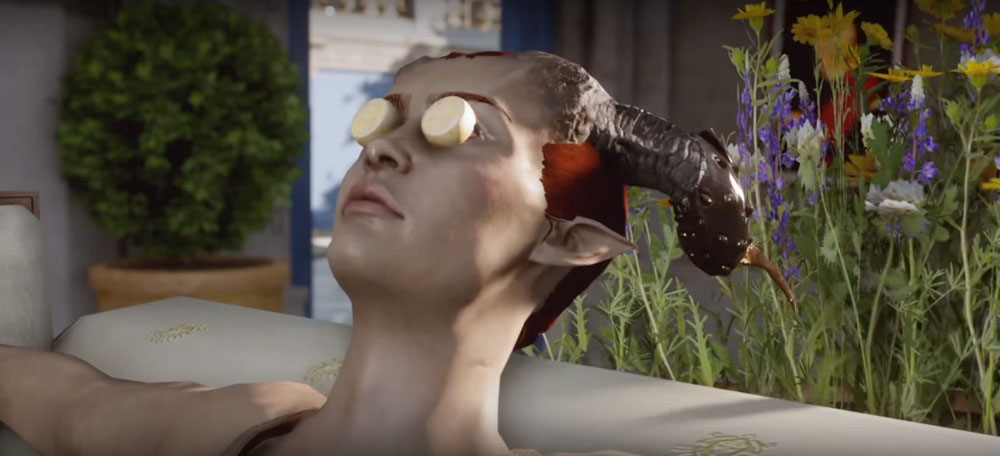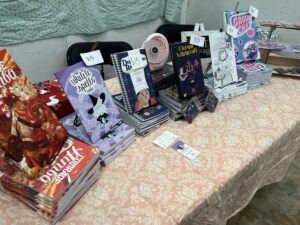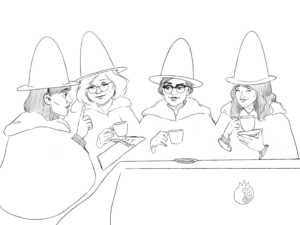You probably know the story: it’s been a long, hard week. You’ve worn yourself out at your day job, you don’t know if you have the energy to pursue your side interests, and you don’t really want to be around other people. Maybe your laundry’s piling up or your dog is visibly bored, but you just can’t be bothered to do anything about it. Your “get shit done” meter’s low, and it’s time for a recharge, dammit, so what do you do? If you’re me, you fire up that outdated game console (PS3) and play a devastatingly long RPG (Dragon Age: Inquisition) that you chose specifically for having the maximum value in hours played vs. dollars spent at the used video games store.
I love RPGs, especially ones like Dragon Age where I have so much control over the appearance and personality of my characters, and my choices have real consequences. My threshold for the adrenaline and hormone rush caused by fear is embarrassingly low – I once found myself unable to sleep at night for literally three days after watching a documentary about Amityville on A&E – so I relish slipping into a fantasy life that contains enough complexity and adventure to keep my neurons firing and my heart beating while knowing that I am in no actual physical danger.
In my attempt to use Dragon Age as a form of self-care, I’ve noticed that many of the daily anxieties and coping mechanisms I’m seeking respite from tend to rise to the surface. These imperfect ways I have of interacting with the world, as it turns out, don’t care if that world is “real” or “fictional.” Thanks to honest-to-goodness in-person therapy, I’ve developed some techniques for noticing these idiosyncrasies and making adjustments, where possible, to behaviors that end up doing me more harm than good. What follows is an abbreviated and incomplete list of ways I’ve applied those techniques to a fictionalized avatar of myself in a setting that appears to have no actual bearing on my real life. Some of my adjustments are, well, less effective than others. But, who knows? Maybe with enough game-time practice, I’ll get better at this whole mind management deal.
Perfectionism

Many people seem to think perfectionism means consistently working hard to meet a high standard of quality. What it actually means for people like me is setting almost-to-actually impossible standards and feeling so overwhelmed by the idea of trying to meet them that you never actually start.
This tends to manifest for me in the process of skill development and accessorizing my character. Battle strategy is not one of my main interests when I play RPGs: I’m one of those weirdos who are not just most compelled by story, but will power through a bunch of fighting or item collecting or whatever just to get to the other end of the narrative. Nonetheless, I find myself obsessing over the perfect skill set for each of my characters. I can spend whole hours staring at skill trees, trying to determine which cluster of abilities suits not only each individual character’s personality and aptitudes, but also keeps the team balanced – a problem compounded by the fact that I really have no idea what I’m doing, and deep down, don’t even really care! Oftentimes, I’ll hold on to ability points for way too long, just because I don’t want to face the decision of what to do with them.
I’m even worse with weaponry and armor: I constantly find my inventory full because I can’t bear to let go of items I don’t use. What if this nondescript amulet I found under a rock turns out to be extremely vital in a future battle hours down the line? What if I acquire a party member later on who this common level 3 longbow would be perfect for??
Behavior Adjustment:
Auto level-up! Haha, just kidding. While I do miss the days of endlessly grinding for XP and letting the game bestow skills upon me, blissfully free of customization options, I could never relinquish my need for control, let alone my bizarre internalized “fake gamer” stigma. Instead, I force myself to sell everything I’m not wearing and make skill choices based on pure whim. Kind of like real life!
Social Anxiety

Very recently, I played through a major event where I encountered the game’s biggest baddie, The so-called Elder One, for the first time, a brief portion of which involved me attempting to save villagers from demons and dragons and whatnot. I did okay, but failed to save a couple of people. (I mean, how was I supposed to know that I was supposed to stab a bunch of crates with my knives to help a guy through an obstructed door?? That sounds fake but okay!!) As a result, there are a couple of people currently working for my character who hate my stinking guts. Like, your-enormous-clumsy-ass-couldn’t-walk-over-a-wide-beam-to-rescue-me-from-a-burning-building-and-now-I-have-debilitating-emphysema hate. Another NPC could not contain her loud derision for my choice of allies and was shipped away to a rural post. I was horrified to discover just how real the consequences of my actions were, including my well-intended ones. My first instinct was to load a pre-boss fight save and use my new knowledge to execute those failed rescues perfectly. That way no one hates me and everyone thinks I’m the next best thing to Andraste herself, right?!
Behavior Adjustment:
It’s a fun moment when you realize that your frequent worrying about whether people like you and whether the things you say and do are off-putting or annoying to other people extends beyond real life and into fictional worlds. I’ve learned in therapy that in the real world, you don’t have any control over the way people react to you, and that adjusting your words and actions in an attempt to please everyone is an exhausting zero-sum game. While in Dragon Age I technically can go back in time and explore how people react to every possible version of me, it would be just as crazy-making to try in the game as it would be in real life.
Lately, when I make choices that result in people disliking or criticizing me, I try to let it go and move on. If I really care about a character I’ve harmed and the game gives me an opportunity to try and make it up to them, I’ll give it a shot, but otherwise, I will try to keep focusing on the hundreds of other missions and objectives available to explore. When I’m conversing with NPCs, I try to think about how my character would feel and respond accordingly, rather than falling into a pattern of choosing the responses I think those characters would approve.
Decision Paralysis

I’m going to be very honest for a second: I became a trauma survivor before I graduated college, and for much of my adult life until now, I have been focused on surviving and building a sense of stability and security in my life. I think I’ve succeeded there: I’m very grateful to be settled in a city that has a lot of warmth and beauty to offer, in a home that I can call my own with a loving, gentle, supportive partner. But now that I’ve met some of those wellness goals, I find myself currently at a crossroads in my personal life, trying to figure out what I want to do, who I want to be, and most perplexing of all, how to get there. I’m privileged to have many possible options and paths before me, but my anxious brain has myriad obnoxiously clever ways of blocking me from setting foot down any of them, for fear of closing off my alternatives forever.
So the last thing I want during my “down time” is to be presented with an even greater number of priorities to organize than I’m currently facing in my actual life. Now that I’ve gotten past a major event of the game and settled into the Inquisition’s permanent headquarters – a castle the size of a goddamn city – I feel as though a Hellmouth has split open before me, spewing out an unending parade of brain-scrambling *shivers* choices.
Behavior Adjustment:
War, responsibility, and strategy be damned: I’m going to the masquerade ball to flirt myself into a corner. Hit me up, anonymous homicidal zealot hotties! I’m comin’ for ya.
Sexuality

As a bisexual woman married to a cis man, I get to feeling a bit lonely a lot of the time. I’m very proud of my queerness, but due to my relationship status and gender presentation – slothful femme, to be exact – straight and queer people alike don’t necessarily see or understand the fullness of my identity. Not only that, but I tend to self-isolate: I’m naturally on the shy side, and feeling like a bit of misfit in both queer and straight spaces only aggravates my introverted habits.
I’m still in the process of developing strategies for making myself more visibly myself. In the past, I’ve written both humorous and serious essays about my bisexual experience; participated in bi-specific social meet-ups; gone to queer art shows and music festivals and movie screenings; and most recently, I even helped organize a rally. It’s not easy, especially as someone whose energy is very quickly depleted by most social interactions, but I’ve made a lot of progress over the few years I’ve been out.
When I started playing the game, I knew I wanted to play my DA:I character as a fantasy version of the most queer me I could be. What does that look like? First of all, I’m basically a literal devil, with a gigantic ripped bod and enviably shiny black horns. It just doesn’t get much gayer than that. My doppelganger also enjoys flirting aggressively with everyone and, unlike the “real” me, who prefers to distance herself with great haste from attractive women, never misses an opportunity to make a gal blush with a borderline inappropriate comment.
I was also dead set on romancing another woman character. If I’m playing out my Super Sweet Queer Teen fantasies, there’s just nothing quite like a couple of bulky rogue lasses sweet-talking one another into bed, right? This strategy turned out to be much more challenging than I thought. My first pick, Vivienne, was unequivocally unavailable, unswervingly committed to her Sugar Duke. I immensely enjoyed teasing Cassandra, but on top of being a bit of a stick of the mud, she’s also just not an option. Josephine I liked, but her enigmatic personality made it pretty hard to read at first whether she was into me. And Sera, well… she’s just not my type. At all.
And then I met Iron Bull – lustful, gruff but principled, a fellow Qunari, and best of all, a fellow non-monosexual! Maybe the relative flatness (and straightness) of the women is a failing of the game, or maybe Iron Bull would make anyone question their sexuality, but my undeniable interest in him revealed the slipperiness of my original motives. Was I hoping to prove something to myself by singling out the women? Was I trying to get a vicarious taste of an experience that I’ve chosen (for the time being) not to include in my life? Despite the fact that I find Iron Bull by far the most eligible candidate for the Official Remover of the Inquisitor’s Pants, I have so far hesitated to put all my sexy eggs in his basket. I worried that choosing Iron Bull would erase my character’s intended queerness, replicating a favorite thought pattern for my real-life anxiety to cling desperately to. In the video game, as in reality, I once again found myself drowning in angsty bisexual feels.
Behavior Adjustment:
I’ve narrowed down my choices to Iron Bull and Josephine. Can you be poly in Dragon Age? Don’t tell me – I’m going to keep focusing all my flirtation energy on both of them until I’m forced to find out.
I still have a long, looong way to go if I’m ever going to finish this game, and I admit that I haven’t had much time to put most of these adjustments to the test. Sometimes, when I find myself noticing all these bizarro-world manifestations of very real challenges, the prospect of picking up the controller to face them head-on sounds more like work than fun. But in the spirit of adventure, I know it won’t be long before I head back into battle, armed and ready to tear apart the darkspawn of my heart.




